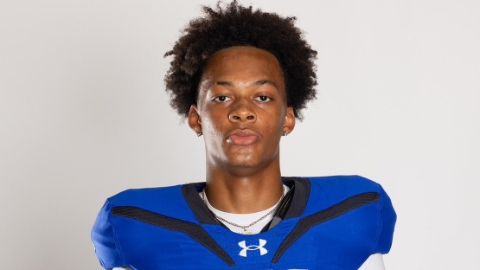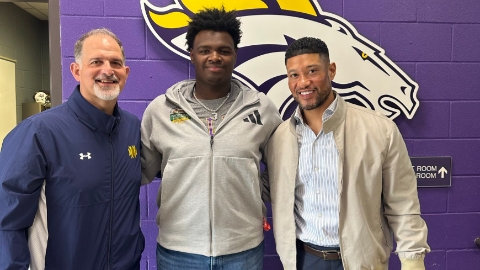2024 Notre Dame DE Target Benedict Umeh Truly One Of A Kind
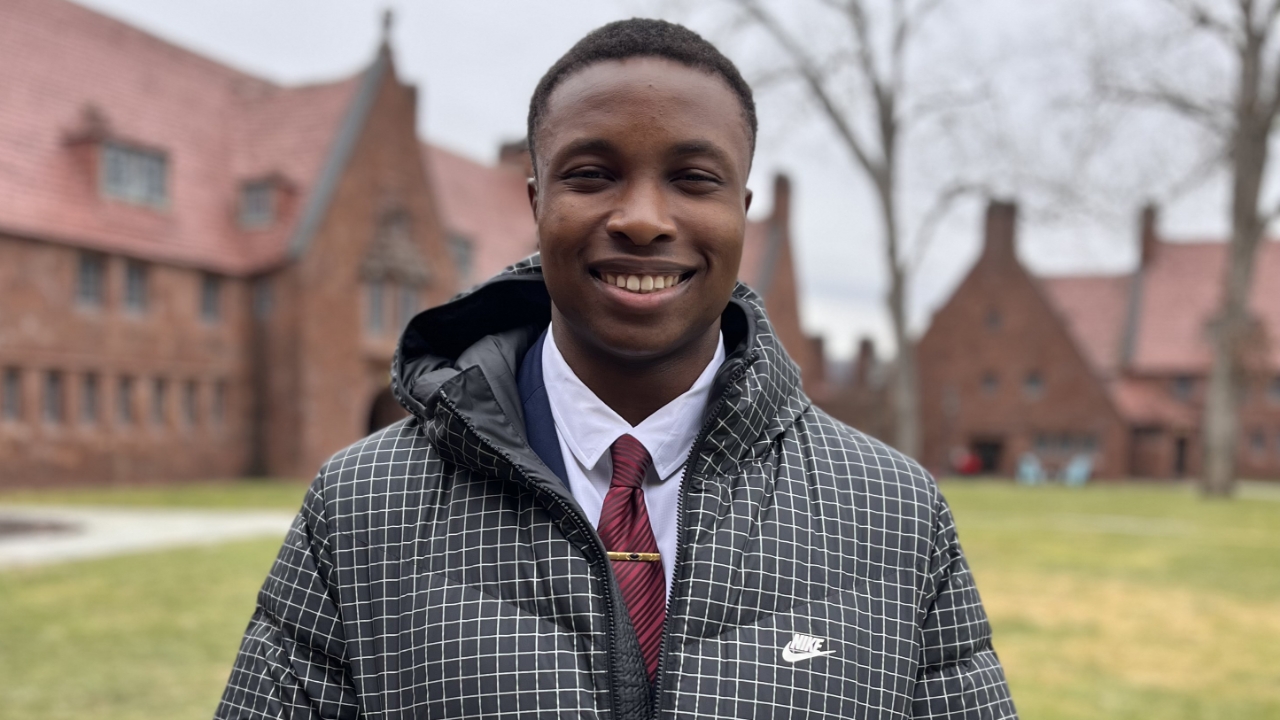
Had Benedict Umeh and Oral Sybblis not been walking through the same park on the same day at the same time, you wouldn’t be reading this story right now.
Umeh wouldn’t even be a football player right now.
“No,” Umeh laughs at the idea that he would have found his way to the sport some other way.
“No way.”
That chance encounter led Umeh to a sport that promises to take him further than he imagined and has already brought him to a new country.
These days, the Toronto native seems perfectly at ease in his new surroundings on the picturesque campus of Avon Old Farms, an elite prep school in Connecticut.
The building where head coach Jon Wholley’s basement office resides feels like it was one of the first erected at the school, which was founded in 1927. This is the lab where Wholley has spent countless hours calculating, formulating and ultimately constructing one of the top prep football programs in New England.
Mixed in among roster management charts and schematics is a schedule of the college coaches who will be visiting the office that week. It features some of the most recognizable names in college football and most are coming to learn more about the kid from Canada who picked up the game just a couple years prior.
Umeh had a plan.
He was doing well in track and enjoying volleyball, but academics was the primary focus in his family.
“My mom's a doctor and my dad's a lawyer,” he says. “My sister's pre-med. My older brother's in Computer Science. My oldest brother is studying Literature in Saskatchewan.”
With straight A’s in International Baccalaureate courses at his high school, Umeh was on track to pursue a career in Computer Science.
“I couldn't make it to any of my dream schools in the States, but I'm like, 'I'll go to (University of Toronto), top 10 Computer Science program and get a job out of there.'
“That was my plan.”
Plans changed that day, when he encountered Sybblis in the park right near where West Toronto Prep’s football squad was practicing.
Sybblis stopped the 6-foot-5, 215-pounder.
“He was like, 'You should be practicing with them. You're more than big enough,’” Umeh recalls. “He said, 'Just show up. I'm going to talk to the coach. Just show up and practice with them, see how you like it.'”
Umeh did show up, but he didn’t like it.
“I loved it,” he says.
He wasn’t very good at first.
“I'm tall, but that's it,” he laughs. “The thing that really stood out about me was I was fast because I'd been doing track my whole life. I was fast and big, that was it.”
“For me, sports have always just been sports. The physical side of sports is more important to me than the actual intricacies of the sport I'm playing. When I'm playing volleyball, I'm thinking, 'Run. Jump. Hit. Side to side. Vertical movement.’ The same thing in track and field. Those skills kind of translated to football, just in terms of being a big guy who can move around pretty well.
“The contact was new. I hadn't played a contact sport like that before. I loved it though. No complaints.”
The potential was obvious to Sybblis, who began seriously training Umeh.
“I would just show up to practice and he'd be like, 'I've watched your film. This is what you've got to do here, here, and here for this, this and this reason,’” Umeh remembers. “I'd be like, 'Alright, Coach. You're right.' And it's been working out.”
Umeh practiced staying low and delivering a punch. In the weight room, he worked on plyometrics and his bench press to improve his upper-body strength.
He devoted so much time and attention to football that his grades began to slip, at least relatively so.
Umeh enrolled at West Toronto Prep, which was $7,500.
He put his Computer Science skills to work with the school’s social media department to pay for half of the tuition and then picked up a part-time job at T-Force Freight to pay the other half.
“I was working overnight for a pretty long time and my Chemistry grade slipped a little bit, same with French because I was working on transportation; unloading and offloading trucks,” he says matter-of-factly.
Umeh has to be pressed for more details.
During the offseason, his mother would bring him to school for 8:30 each morning – “Thank God my mom used to drive me” – and then come home and get five or six hours of sleep.
“Wake up, do all my homework and get to the factory,” he continues. “It was a pretty short walk, a 30-minute walk from where I was. I'd walk 30 minutes over there around like 12 and then work there, come back around 6:30, 7, take a shower, chill for a little bit and go to school.
“That's how I paid for it. My parents covered my helmet and stuff though, which was pretty cool.”
By then, Umeh had his sights set on using football to get down to the States and a chance at one of those dream schools.
Umeh played the 2021 season at WTP, at least what there was of a season.
“We played two games because things just weren't really lining up for the team,” he says. “I'm like, 'I've really got to get somewhere where I'm at least going to get games to play. Forget playing time.'”
So, he spoke with Sybblis.
“He was like, 'Oh, I know a guy,’” Umeh says of Sybblis. “He'll get you set up with the best school possible. I know you're big on academics, so we'll get you somewhere good.'”
Sybblis was referring to Justin Dillon of 730 Scouting, a service that helps Canadian players get to prep schools and colleges in the States.
“I watched the film and I was intrigued,” says Dillon, who knew Umeh had a chance to be a national prospect in the right situation. “I saw his size and the twitchiness he had for that size. He was raw like most Canadians are, but he had the athletic ability, the size and the strength.
“I spoke with his father and his father said, ‘Listen, the only way my son is leaving Canada is if you place him at a high-academic school.”
Dillon had a couple places in mind he knew would be perfect fits, including Avon and Wholley.
“I love Coach Wholley,” Dillon says. “I think he’s a great coach. Those guys are great at developing kids and getting them ready for the next level.”
Wholley eventually reached out directly to Umeh.
“He recruited me the hardest, so I came here,” says Umeh.
Trusting Wholley is a decision Umeh hasn’t regretted.
“He's great,” Umeh says. “He does everything. He's always working. He doesn't stop thinking about football. He doesn't think about anything except football.
“He helps out a ton with recruiting. He knows everybody. So, it's been great.”
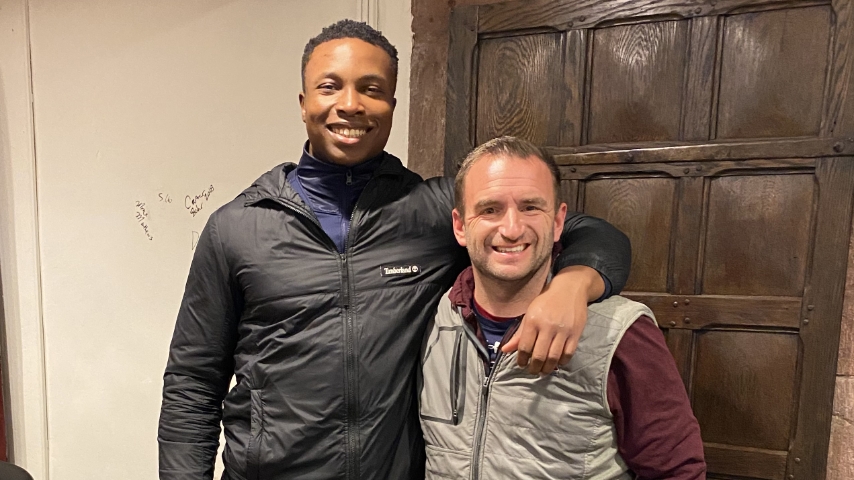
Umeh was the first student to arrive on campus at the end of August. The adjustment wasn’t huge and he was pleasantly surprised with the dorm situation.
“I was used to living by myself for the most part because I lived with my siblings in Toronto,” he says. “My mom works as a doctor in Saskatchewan. My dad's in Nigeria a lot of the time. So, I lived by myself for the most part for a long time.”
There may not have been a huge adjustment to the living situation, but there was definitely an adjustment to the football field, especially after being sidelined with COVID the first week of camp.
“The pace and the speed of the game is just different than it is in Canada,” he says. “It's a lot more regimented than WTP, obviously. We were waking up at 6 am every day, going to sleep at 11.
“The whole day is just full of work, work, work. Take a nap when you can. That took a little bit of getting used to. The school itself is also a lot more rigorous.”
Now that he’d put himself in position, Umeh knew he needed to take advantage of his opportunity, but it didn’t happen right away.
“I was kind of stressing out because I went three games in the middle of the season and I didn't make a single tackle,” he says.
Umeh spent extra time watching film, extra time on the field before practice, extra time on the field after practice, extra time in the weight room.
“The way I look at it is I'm going to do the best I can no matter what I'm doing,” he says. “If I'm doing my homework, I'm doing the best I can. If I'm wrestling, I'm doing the best I can because I know if I go to sleep and I'm thinking, 'Oh, I didn't win that match, but I also didn't put in my best effort,' I can't go to sleep.
“As long as I know I'm trying my best, I'm doing everything I know I can with football, even if the recruiting wasn't going right, I wouldn't be that mad because I gave it my best effort. So, I'm like, if it comes, it comes. If it doesn't, that's life.”
He may have been stressed, but Wholley wasn’t.
“I was talking to Coach and he's like, 'It's fine, your film looks great. The ball just isn't going your way,’” Wholley tried assuring him.
“I wasn't hearing it. I'm like, 'I have no stats.' So, I thought my recruiting was over with.”
Umeh admits his faith in becoming a highly-recruited prospect as everybody had promised was shaken.
But Wholley was right and by the end of the season, Umeh was producing on the field in line with his physical potential.
“That's when the recruiting really started,” he says.
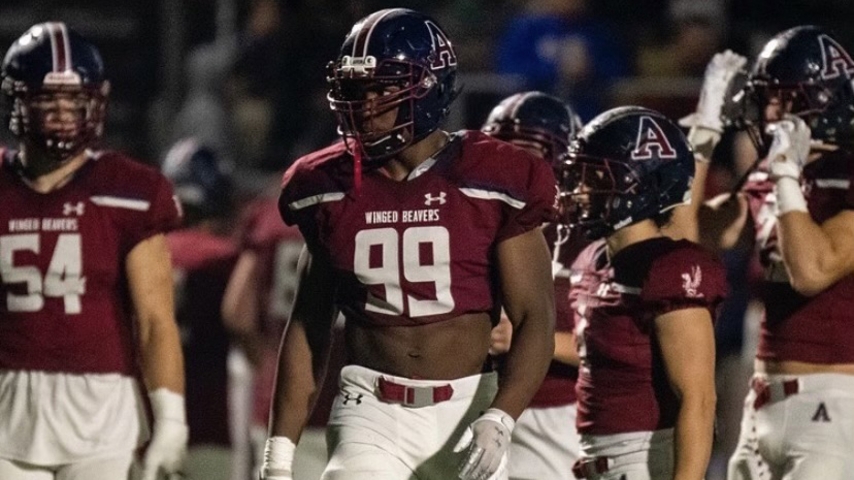
The process truly began when UMass defensive line coach Valdamar Brower extended a scholarship offer from the Minutemen back in June. That was followed up with offers from Dartmouth, Bowling Green, Rutgers and Brown before his season started.
But it really took off later in the fall with offers from Penn State, Wisconsin, Virginia Tech, Duke, Minnesota, Nebraska, Wake Forest, Boston College, Iowa, Yale, USC and Notre Dame among others.
Eventually, schools like Stanford, Georgia, Michigan, Florida, Miami, Oklahoma and Auburn among many others would join the list.
“It just started with calls,” he says. “Schools came down to visit, they'd watch us practice, they'd watch us work out. And then like a week after, I'd get an offer.”
Umeh says it’s been a crazy experience, but he’s not letting the change in circumstances change him.
“I'm not acting any different,” he says. “It's the same mentality really because nothing's really changed. Some of these offers probably aren't even real, a lot of these offers might not even be committable.
“The way I look at it, I'm going to keep working, I'm going to keep showing up and once I'm ready to make a decision, I'll make a decision. If that isn't available, I'll make the second-best decision.”
